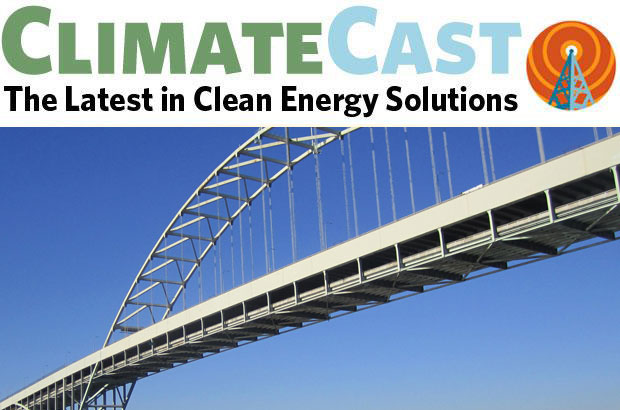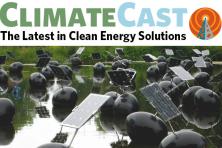Climate change on the ballot
Solutions to climate change were front and center in an array of candidate and issue campaigns around the country this Election Day. In Washington State, Initiative 1631 - a ballot measure to protect air and water and build new clean-energy infrastructure through a fee on the state’s largest polluters - was backed by a large and diverse coalition and had broad support, but was unable to overcome the most expensive initiative in state history,paid almost completely by the oil industry and featuring misleading ads. The Portland Clean Energy Initiative passed with over 64% support, and will raise approximately $30 million per year for clean energy investments and job training, focusing in low income communities. Oregon Governor Kate Brown was re-elected, defeating an opponent who wanted to roll back the state’s Clean Fuels Program and stymie efforts to pass cap-and-invest legislation. Several climate champions were elected to the Legislature in both Washington and Oregon.
Beyond the Northwest, several other states considered clean energy initiatives but with mixed outcomes in the face of opposition spending. Two states had initiatives on the ballot to transition to 50% renewable power: Colorado’s initiative won, but Arizona’s was unable to overcome huge opposition spending.
In candidate races, strong advocates for clean energy beat climate deniers and proponents of the fossil fuel economy in multiple congressional and gubernatorial races around the country. In the House, four new members of Congress are calling for a New Green Deal to turn away from fossil fuels and build renewable energy infrastructure, and Democratic leadership plans to revive the select committee on climate change. But with Republicans gaining seats in the Senate, no climate legislation is expected to pass any time soon given that Party continuing to block federal action.
Clean energy expands to meet increasing demand
In Oregon, major utility Portland General Electric is on track to add 100 MW of clean energy generation by the end of this year. Projects include not only wind and solar, but battery storage too. These projects are coming to life thanks at least in part to the 2016 Coal to Clean legislation, which requires major utilities to transition off coal-fired power coal by 2030 and reach 50% renewable power (not including hydropower) by 2040. In Puerto Rico, lawmakers have introduced a bill that would commit Puerto Rico to getting 100 percent of its electricity from renewable energy by 2050. In Great Britain, analysts project that summers could be entirely powered by clean energy by the middle of the century.
Magical science
Following the scary predictions of the most recent IPCC climate report, there has been an increased urgency around how to more quickly transition to a clean energy economy. Others explore not only how we can use more clean energy, but how we could potentially suck carbon out of the atmosphere. Some scientists believe that carbon removal will be “absolutely necessary” if we are to avoid the worst-case climate scenarios. A new assessment from the US National Academies of Sciences, Engineering and Medicine states that some carbon capture are ready to be deployed now. However research into carbon capture still straddles the line between fact and fiction, as this review of recent investments shows.
Countries, states and companies moving forward on climate with or without US
Canadian Prime Minister Justin Trudeau announced that Canada will impose a carbon tax in provinces that don’t implement their own carbon pricing policies. In Oregon, Governor Kate Brown has issued an executive order to block offshore drilling, joining several coastal states in taking action to protect their coastlines in response to the federal government seeking to expand offshore drilling. Two of the biggest automakers have joined California lawmakers to push back against another proposed federal policy that would rollback of U.S. fuel economy standards. General Motors is urging federal regulators embrace a nationwide electric-car sales program starting in 2021, while Honda is calling for steadily increasing requirements to continue.
Two steps forward, one step back
In Brazil, voters elected Jair Bolsonaro as president, who some have labeled “the Trump of the Tropics.” In addition to fears for human rights, he has also committed to dismantle environmental policies that protect the Amazon, “a crucial part of the planet’s carbon emission-curbing toolkit.”
The Trump administration has approved a plan to build an artificial gravel island in the Arctic and use it to extract crude oil, the first approval of an oil production facility in federal Arctic waters. Following in the footsteps of disgraced former EPA administrator Scott Pruitt, Interior Secretary Ryan Zinke is under investigation by the Justice Department for self-dealing. If he steps down, Deputy Secretary David Bernhardt, a longtime lobbyist for the oil and gas and water industries may be ready to step in, and may be more adept at knowing how to enact Trump’s pro-fossil fuel, anti-regulatory policies. Remember the EPA webpage on climate change that was taken down “to be updated”? It appears to be gone for good. The epa.gov/climatechange now reads, ironically, “we want to help you find what you are looking for,” with links to search other areas of the EPA website.
Climate impacts push the world to extremes
In addition to violence, corruption and poverty, experts say that climate change is increasingly causing people to need to migrate from Central America, and that the conditions will only get worse. In Guatemala, adverse climate conditions impact food security, reducing agricultural production, limiting agricultural work, and contributing to chronic malnourishment in children under five years of age.
In the Northern Mariana Islands, super typhoon Yutu has left behind storm damage that residents are calling “the worst they have ever experienced.” Winds sustained up to 180 miles per hour, and damaged critical infrastructure. Italy is experiencing historic flooding that has led to the deaths of 29 people so far, inundating cities, and damaging historic sites. New research shows that these stresses won’t improve any time soon, as greenhouse gases are increasingly disrupting the jet stream, causing more frequent summer droughts, floods and wildfires. New research also reveals that the world’s oceans have absorbed as much as 60 percent more heat than previously thought, meaning that the earth could warm even faster than previously predicted. If you’re curious to know how your city’s weather will be different just one generation from now, check out this new tool projecting our climate future if we don’t change course.
In Brief: The Good, the Tough, and the Just Getting Started
Climate Solutions Executive Director Gregg Small reflects on how climate and clean energy fared in the 2018 election in the Pacific Northwest, and shares the inspiration he has drawn from the breadth and depth of the coalition that came together for Washington’s Initiative 1631.




